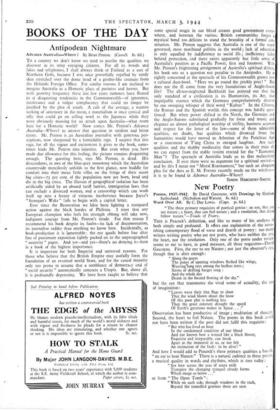BOOKS OF THE DAY
Antipodean Nightmare
Advance Australia—Where ? By Brian Penton. (Cassell. 8s. 6d.)
To a country we don't know we tend to ascribe the qualities we discover in its stray voyaging citizens. For all its woods and lakes and telephones, I shall always think of Finland as a. sort of Northern Gobi, because I was once powerfully repelled by sandy skin stretched over the dome head of a gnohie-like creature from the Helsinki Foreign Office. For similar reasons I am inclined to imagine Australia as a Homeric place of pastures and heroes. But with growing frequency these last few years rumours have floated in of disquieting tendencies in the Commonwealth—of ignorance, intolerance and a vulgar complacency that could no longer be justified by the plea of youth. A cult of the average, a wanton seeking of sanctuary in the mean, a materialism at once cynical and silly that could go on selling wool to the Japanese while they were obviously massing for an attack upon Australia—what room here for a Homeric world? Now comes Mr. Penton's Advance Australia—Where? to answer that question in stridant and bitter terms. Mr. Penton is an Australian journalist with generous per- ceptions, now sharpened by a formidable rage. I suspect that this rage, for all the vigour and excitement it gives to the book, some- times leads Mr. Penton into injustice. But even when you have made due allowance for this feeling, the picture remains disquieting enough. The questing hero, says Mr. Penton, is dead. His descendants, in awe of the blue-grey monotony which the Australian countryside mercilessly unfolds to the first• glance, now huddle for comfort into their mean little villas on the fringe of their mean big cities-75 per cent. of the population now are born, bred and die in the big cities. The illusion of geographical isolation has been artificially aided by an absurd tariff barrier, immigration laws that can exclude a divorced woman, and a censorship which can work itself up into a frenzy of virtuous incoherence because Joyce's "finnegan's Wake" fails to begin with a capital letter.
Ever since the Restoration we have been fighting a rearguard action against the black hordes of Philistia. I trust that any European champion who feels his strength ebbing will take new, indignant courage from Mr. Penton's tirade. For that reason I recommend his book despite its faults—its lack of documentation, its journalese sadder than anything we know here. Incidentally, as book-production it is lamentable : the eye quails before line after line of passionate exposition tightly packed on to the unparagraphed " austerity " paper. And yet—and yet—there's no denying it—here is a book of the highest importance.
It is important for both Imperial and universal reasons. For those who believe that the British Empire may usefully form the foundation of an eventual world State, and for the casual majority only too prone to assume that a semblance of democraLy and of " social security " automatically concocts a Utopia. But, above all, it is profoundly depressing. We have been taught to believe that some special magic in our blood creates good government every. where, and between the various British communities forges mystical bond too delicate to stand the brutality of a formal con- stitution. Mr. Penton suggests that Australia is one of the worst governed, most moribund polities in the world ; lack of education is only equalled by indifference to social ills; inefficiency hides behind protection, 4nd there exists apparently but little sense of Australia's position as a Pacific Power, first and foremost. With Mr. Penton's frightening arraignment of Australia's spiritual defects, his book sets us a question not peculiar to the Antipodes. He is rightly concerned at the spectacle of his Commonwealth _grown into a cultural dust-bowl. " Here we go round the prickly pear! " But does not the ill come from the very foundations of Anglo-Saxon life? The all-too-neglected Burkhardt has pointed out that the only standard of a civilisaticn is its Humanities, its Art, that impalpable essence which the Germans comprehensively destroy by one sweeping whisper of their word "Kultur." In the Chinese, the Roman and the Spanish worlds this concept was hardly ques- tioned. But when power shifted to the North, the Germans and the Anglo-Saxons substituted gradually for form and music and elegance an almost pathological worship of virility, business acumen and respect for the letter of the law—some of them admirable qualities, no doubt, but qualities which divorced from the humanities would have moved an Athenian of the Periclean Age or a statesman of T'ang China to enraged laughter. Are such qualities and the shabby mediocrity that comes in their train all we can expect from the stable system erected for the " Economic Man "? The spectacle of Australia leads us to that melancholy conclusion. If ever there were an argument for a spiritual revival— and by this I mean not " Moral Rearmament," but such an eloquent plea for the Arts as E. M. Forster recently made on the wireless— it is to be found in Advance Australia—Where?
SIMON HARCOURT-SMITH.


























 Previous page
Previous page